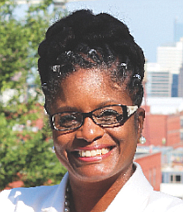Majority of families in public housing are behind on rent
Jeremy M. Lazarus | 2/17/2022, 6 p.m.
More than half of the renters in Richmond’s public housing communities — 55 percent — are now behind on rent, according to a report provided Monday to City Council.
Currently, 1,744 households owe $1.8 million in past due rent, Stacey Daniels-Fayson, interim chief executive officer of the Richmond Redevelopment and Housing Authority, told City Council.
Ms. Daniels-Fayson said that represents an increase of 237 households since January, when she reported that 1,507 households, or 48 percent of the 3,127 households living in RRHA properties, were in arrears. At that point, the arrears amounted to $1.5 million.
Of most concern, she said, are the 886 households that owe $500 or more in back rent, with a portion owing between $1,000 and $5,000. The remaining 858 households owe between $50 and $500, she said.
She told the RRHA’s Board of Commissioners that a representative of the U.S. Department of Housing and Urban Development, which owns public housing and funds a portion of public housing operations, said “RRHA is not unique” in having large numbers of tenants in arrears.
RRHA already has collected more than $4 million in rental payments from the state’s $1 billion rental relief program, anticipates collecting another $500,000 and has applications pending for another 533 households.
That state rental relief program has provided significant help for RRHA and other landlords. As of Dec. 31, the program had paid $598.6 million in 121,401 relief payments for 85,271 households in the state. Some of the households were in arrears with rent at least twice and it was paid through the program.
Still, Ms. Daniels-Fayson told the council that RRHA is not rushing to evict families who have fallen behind, particularly the 886 households who owe $500 or more who would be initial targets.
She said RRHA is following state law requirements to ensure that landlords and/ or tenants first apply for rent relief before eviction proceedings can begin.
As part of RRHA’s process, she re-confirmed that RRHA is working with community groups to conduct a canvass of renters who have fallen behind to ensure they are participating with RRHA in applying to the state program that was set up to limit evictions of hard-pressed renters during the pandemic.
She also confirmed that until the full canvass is completed and every household in arrears is contacted, RRHA would not begin lease enforcement activities, indicating that court filings for eviction likely would not begin before March and potentially not until April.
RRHA, though, cannot put off lease enforcement forever. HUD regulations require every public housing authority to collect rent and to ultimately evict families who fail to pay as agreed.
There is concern among City Council members about the number of families who could lose their homes, adding to the number of homeless people in the city.
According to the RRHA, about two-thirds of families in public housing either receive income from a job or from a government program such as Social Security. However, one-third, or nearly 1,000 households, have no reportable income, according to the RRHA, making it virtually impossible for them find alternative housing if they are evicted.







